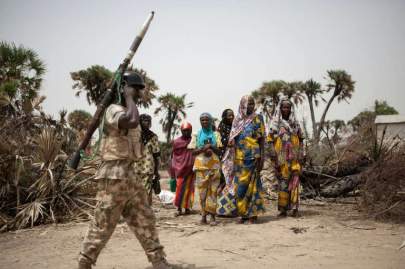Thousands flee after Nigeria jihadist attack kills 10 in northeast town

Watch: Russian jet 'escorts U.S. surveillance plane away from Russian border'
China Capable of 'Substantially Subduing' U.S. at Sea, State Media Boasts
At least 10 people were killed when jihadists attacked a northeast Nigerian town, torching a UN office and triggering an exodus into neighbouring Niger, local officials and the UN said Thursday.
Fighters from the so-called Islamic State West Africa Province (ISWAP) stormed Damasak in Borno state on Wednesday, the third assault on the town in a week, military sources and residents said.
Militants attacked the town, where 85,000 people rely on humanitarian aid, as residents were breaking fast on the second day of the Muslim holy month of Ramadan.
"The destruction the insurgents wrought on Damasak this time is unprecedented," local government chairman Mustapha Bunu Kolo told AFP.
"They engaged the troops in a firefight but were made to withdraw with aerial support."
Kolo and another local official said 10 people were killed in the attack.
The UN refugee agency earlier said eight people were killed and another 12 wounded, with early reports showing 8,000 fleeing residents had reached the Niger towns of Chetimari and Gagamari.
"According to preliminary reports from our partners on the ground, the armed men also burned down several buildings, including a police station, a clinic, residences of local dignitaries and UNHCR's Protection Desk," said Roland Schoenbauer, the UNHCR's spokesperson in Nigeria.
"The full scope of the displacement is not clear at the moment," he added. Humanitarian groups have withdrawn staff due to insecurity.
Nigeria's military has struggled for more than a decade to end a jihadist insurgency in the northeast that has also spilt over into neighbouring Niger, Chad and Cameroon.
At least 36,000 people have been killed and two million have been displaced in Nigeria alone.
Nigerian army spokesman Brigadier General Mohammed Yerima dismissed reports militants had overrun Damasak.
"There was an attack by the terrorists sometime yesterday but they were effectively repelled," the statement said. "As we speak, troops are in total control of the general area."
- 'Supercamp' strategy -
Damasak is host to one of the Nigerian military's so-called "super camps" -- fortified garrisons where the army is bunkered down in an attempt to better defend against attacks.
Critics and local residents say the strategy to pull back into larger bases has left jihadists freer to roam unchallenged in rural areas.
The insurgents have "intensified attacks in this region (Diffa-Chetimari-Damasak) these past three, four months," said Yan St-Pierre, a counter-terrorism specialist with the Modern Security Consulting group.
"Damasak is an important military base, and we can see that ISWAP is increasingly well organised... they adapt their tactics and it destabilises the army."
They are also fighting for control of food markets and access to commercial axes, added St-Pierre.
The EU said on Thursday it was following with "deep concern" the recurrent violent attacks on the town.
"Because of the recent increase of violence in Northeast Nigeria, hundreds of thousands of vulnerable people will be left without assistance in an area where humanitarian assistance was already struggling to reach all those in need," EU Commissioner for Crisis Management Janez Lenarcic said.
Many residents had already fled Damasak towards the state capital Maiduguri or into the town of Diffa across the Niger border following three previous attacks since January, but other residents decided to stay back.
In video clips sent to AFP by sources, hundreds of residents were seen on foot and on donkeys moving along a bush path, laden with personal belongings, as they escaped from Damasak.
The insurgents had previously attacked Damasak on Saturday and Tuesday, destroying humanitarian facilities and killing at least four people, including a soldier. They also hit the town in January.
Due to worsening security in the region, humanitarian workers are struggling to provide aid, with the number of people requiring urgent assistance forecast to rise to 8.7 million this year.
ISWAP, which split from the jihadist group Boko Haram in 2016, has become a dominant threat in Nigeria, attacking soldiers and bases while killing and kidnapping civilians.
President Muhammadu Buhari's security forces are battling on several fronts, including the northeastern jihadist conflict, criminal kidnap gangs in the northwest and a surge in separatist attacks in the southeast.
Photo: © Florian PLAUCHEUR Troops have been stationed in Damasak for years as part of the conflict
Link: https://www.msn.com/en-us/news/world/thousands-flee-after-nigeria-jihadist-attack-kills-10-in-northeast-town/ar-BB1fGE6Z











